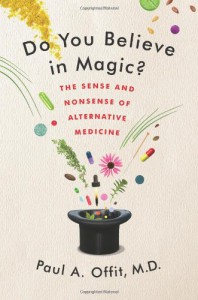
A prominent MD has been making the rounds on talk shows recently bashing vitamins with a new book that’s come out called Do You Believe in Magic? The Sense and Nonsense of Alternative Medicine (Harper, 2013).
“Now on the stump, he encourages thinking more critically about healthcare treatments. Too bad his is a one-sided view. And that his intended audience is unlikely to be convinced because health information has been increasingly available over the last 25 years. Nor do many physicians and prominent medical organizations subscribe to his views (although a few legislators do).
 “People are systematically choosing to manage their own health in a way that is unprecedented,” points out James S. Turner, chairman of Citizens for Health, a health advocacy group with over 100,000 members. “The conventional treatments that Offit champions are often very helpful. The problem is that the industry has oversold them, and more and more people see that now.”
“People are systematically choosing to manage their own health in a way that is unprecedented,” points out James S. Turner, chairman of Citizens for Health, a health advocacy group with over 100,000 members. “The conventional treatments that Offit champions are often very helpful. The problem is that the industry has oversold them, and more and more people see that now.”
If Offit’s book had aimed to explore all health options even-handedly for their upsides and their downsides, it might have truly advanced the conversation about how to better health and lower healthcare costs. (And ranking below 16 developed nations across the lifespan and for all income levels, while stuck in the midst of a polarized debate over costs and coverage, the U.S. sorely needs that conversation.) But instead, in his book and media tour, Dr. Offit plays the predictable role of debunker, single-mindedly championing his own medical brand. Unfurling an arch skepticism about the use of herbs and other nutritional supplements, for example, Offit presents himself as the stalwart for science. But it’s instructive to see what happens when he encounters someone conversant with the health literature.
In a radio exchange with NPR reporter Ira Flatow and Victoria Maizes, MD on Science Friday, Offit targeted St John’s wort. Based on a single study, he dismissed its efficacy. Maizes, the executive director of the Arizona Center for Integrative Medicine and a professor of medicine and public health at the University of Arizona countered with a 2008 review of 29 trials—including 17 that compared SWJ to standard antidepressants, and found it just as effective for moderate depression, with fewer side-effects.
Upon hearing this key finding, Offit never paused for breath before he redirected to attack some other hapless herb. There is an extensive scientific literature on St. John’s wort (and other nutrients available in supplements) but Offit cherrypicks the few studies that validate his concerns that supplements are dangerous.
Say your body needs lycopene and the lycopene content typically found in tomatoes has been depleted by conventional agriculture practices. If you get lycopene from eating a tomato, or even five tomatoes, you’re not trespassing onto the sacred ground of medicine. But if you take a lycopene capsule, you have stepped over a line, Offit and company claim. If conventional medicine were producing such terrific results, perhaps more people would be eager to see what pharmaceutical research would do with that lycopene, beyond spending millions on a special extraction of the active ingredient to make it available only by prescription at skyhigh prices.”
More:
The Medical Establishment's “Favorite” Doctor and His Crusade Against Supplements and Alternative Medicine



